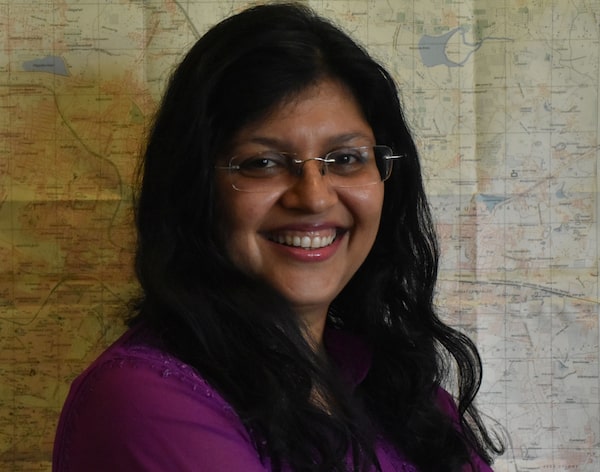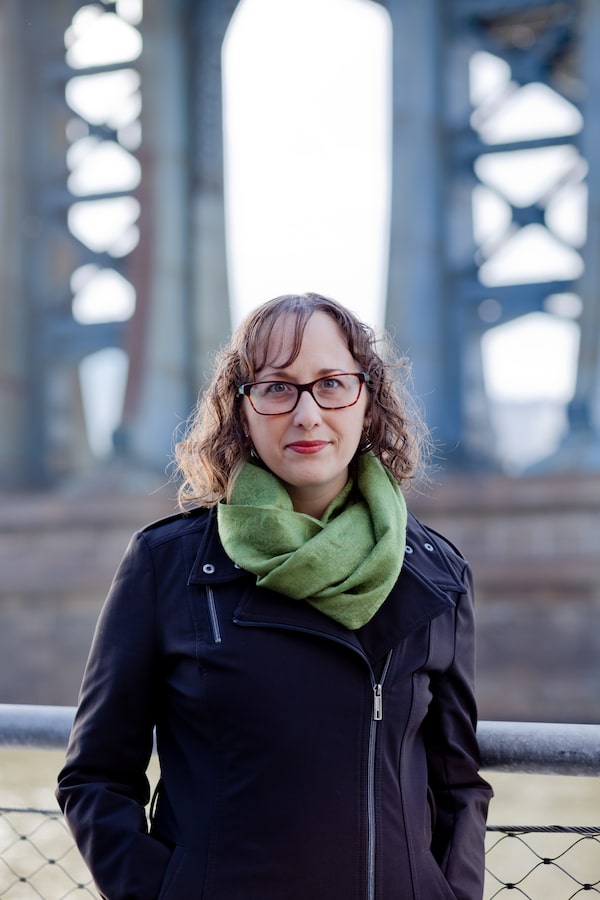
Author Harini Nagendra.Handout
The only thing more intriguing than teasing out the puzzle within a good mystery or thriller? Investigating the minds who make up the knotty, twisty riddles that keep us feverishly flipping pages, hooked on the intrigue and adrenaline they conjure up with their words.
Now, it’s our turn to play detective, as we asked six of the best crime writers out there a few probing questions of our own. (And if you want more mystery chat, several of these authors will be at Motive, a crime and mystery festival held at Toronto’s Harbourfront Centre June 2 to 4.)
What to do (and read) at Motive crime and mystery festival
In these mystery novels, cities are one of the main characters
Do you have a favourite mystery or crime novel? What makes it so good?
“As strange as it seems, even to myself, my favourite crime author was Henning Mankell. Loved his Wallander series, tops in Nordic Noir. Personally, I am stumped as to why they were so fascinating to me. I think sometimes the cold, grey of Sweden mirrors a Minnesota winter, but also how Wallander just keeps plodding forward in spite of his own personal quirks and difficulties. I read one book, then ordered all off the internet, binge read them all, and then learned there was a series on Netflix.” — Marcie Rendon (Sinister Graves)
“One of my favourite crime novels is The Round House by Louise Erdrich. I’m not sure it would have been marketed as a mystery novel, but it’s part of a trilogy called the Justice Series. The setting is an Ojibwe reservation in North Dakota, and the protagonist is a 13-year-old boy named Joe who, along with some friends, finds himself trying to avenge his mother’s assault. Erdrich writes beautifully, and I love the plot puzzle she created for herself by making her narrator a young boy.” — Amy Stuart (A Death at the Party)
“I’d say it’s The Silence of the Lambs by Thomas Harris. It’s a solidly crafted thriller, but what’s evident is Harris’s powerful writing and storytelling. Harris is a former reporter and, to me, his near-poetic writing is a glorious blend of tense journalese and T.S. Eliot.” — Rick Mofina (Everything She Feared)
“It’s hard for me to narrow it down to a single favourite crime novel, but one that has lingered with me longer than most is Shutter Island by Dennis Lehane. Putting aside its memorable, creepy, mid-century Alcatraz-like setting, I am an absolute sucker for a good twist ending. And Lehane pulls off the mother of all twists, upending the reader’s – this reader, at least – assumptions and perceptions of his world. But it’s not a deus ex machina ending. In retrospect, Lehane left a breadcrumb trail of clues the whole journey.” — Daniel Kalla (Fit to Die)
“The Woman in Cabin 10 by Ruth Ware combines three of my favorite elements in a mystery: a stunning setting aboard a private cruise liner, spine-tingling psychological suspense - Lo knows she heard a woman thrown overboard, but no one believes her - and innovative narration, emails and news reports jump forward in time to keep readers on their toes.” — Kit Frick (The Reunion, coming in August)

Author Kit Frick.Carly Gaebe Steadfast/Handout
What influence has our collective obsession with true crime had on the mystery/thriller genre?
“Readers are much more knowledgeable now about crime and investigations, so it keeps us on our toes. And in a way, I think it’s made crime writers more realistic about the kinds of things real people actually do, and more willing to push the envelope.” — Shari Lapena (Everyone Here Is Lying, coming in July)
“I’d say it has meant that regular people have a better understanding of crimes (both how they happen and how to commit them) and so it has opened up doors for us, as authors, in terms of who our protagonists (and/or perpetrators) might be. This is exciting!” — Pip Drysdale (The Next Girl)
“We sometimes think of true crime media’s moment beginning around a decade ago with Serial, but our collective obsession has gone back a long way - think Jack the Ripper and Lizzie Borden, to start. The mystery genre and true crime stories have long been bedfellows, the latter influencing the former by way of inspiration - characters, crimes, investigations - and storytelling devices woven into the text, like podcasts, interview transcripts, newspaper clippings, and more.”— K.F.
“I must confess that I’m not really a fan of true crime. Life is dark and morbid far too often anyway, and I do most of my reading to relax. I think our obsession with true crime, which began with books and radio, and has now expanded to TV and streaming platforms, has inured us to psychological warfare and gore. We want more – more violence and gore, more insights into the functioning of twisted minds and pathologically obsessive killers. I’d prefer a return to the days of the traditional mystery - give me a nice, light, entertaining cosy crime novel any day!” — Harina Nagendra ( The Bangalore Detectives Club)
“I think the crime/thriller/mystery genre allows readers to really tap into the deep sense of ‘what if’ that we carry around with us, especially when the world feels dark. Many of these novels conjure up the things we all fear – dying, cheating, stealing, betraying, killing etc. These days, we seem to really be living the ‘truth is stranger than fiction’ trope, in that some newsworthy happenings around us feel almost hard to believe. Fiction is one way we process real life, so lately the genre is on point. Weirdly, I find mysteries and thrillers are a great way to escape the very things I worry about!” — A.S.
“Most consumers of true crime are women. Their appetite for this material has caused a mini boom of true crime content across TV, streaming and podcasts, but it has also highlighted the presence of women as consumers of crime fiction. Women have read mysteries and thrillers and written them before this boom — just look at Agatha Christie or Patricia Highmsith — yet for a long time we assumed crime fiction was primarily for men, about men. But recent crime fiction differs from the older, ‘manly’ crime fiction and the hardboiled detectives that initially shaped the genre. Nowadays we are in a golden era of domestic noir and much of that is about women and by women writers. Book shelves therefore look quite different than they did ten or fifteen years ago.” — Silvia Moreno-Garcia (Silver Nitrate, coming July)
Which comes first for you: The criminal, the crime or the victim(s)?
“I think the most interesting concept in crime is that you’re very rarely dealing with a psychopathic serial killer or some extreme like that. Most of the time, in real life and in fiction, crimes are committed by people who’d consider themselves decent humans; they might be avenging something, or protecting something, or trying to access something they feel they need. I’m of the mind that most of us are capable of terrible things if put into situations that might warrant them. That’s a central theme in my books. So, it’s the criminal for me.” — A.S.
“For me, in terms of storytelling, they form a triangle. I can start with any of them because the criminal, the crime and the victim are destined to be joined. They are tragically and irrevocably connected.” — R.M.
“The protagonist. So if that’s the criminal then the criminal, and if that’s the victim, then the victim. I need to know who the main character is, what drives them and why before I can figure out what story would bring that out best.” — P.D.
“For me, it’s the detective - in my books, that would be Kaveri Murthy, my amateur detective – and her friends, including her doctor husband, their milk delivery boy, and her inquisitive elderly neighbour aunty, who constitute the rest of The Bangalore Detectives Club. I begin by plotting out the first scene in detail – where the detective is placed in the middle of a situation that calls out for sleuthing - usually a murder, but it could also be another crime like a theft, or even a mysterious disappearance. Once that happens, the suspects begin to identify themselves, slowly revealing their characters and quirks, in the way they respond to Kaveri’s questions, and interact with each other. That’s when the book really takes off!” — H.N.
“Dennis Lehane talked about the difference between tragedy and noir: tragedy is falling from great heights and noir is falling from the sidewalk. I like exploring that slip into the gutter.” — S.M-G.
Is there a trope or cliche in the genre that you think (forgive us) just needs to die?
“Twins. The evil twin. The missing twin. The surprise twin. The twin devoured in utero. Enough already! And I can say this with impunity, because I used the twin trope in an earlier novel. Granted, there have been some very clever twists on this theme. But I think identical twins are vastly overrepresented in the crime landscape. " — D.K.
“I’d prefer not to hear about unlikeable female narrators anymore. I love that women are becoming more central in crime fiction. Let’s let them be full of flaws without being too hard on them for it.” — A.S.
“Are serial killers a trope or cliche? I get tired of them. I also get tired of the protagonist who seems to have superhuman ‘survive any fight unharmed’ capabilities. Should I go on? Excessive sexual and physical violence also irks me.” — M.R.
“One thing I just can’t stand in some mystery/thriller books is the occasional tendency to refer to a female character, even one that has a name and is fully fleshed out, as “the girl.” Whenever I see this, it makes my blood boil. You never see a male character referred to as “the boy.” It’s not just sexist, it’s cliched, lazy writing.” — S.L.
“The femme fatale – sexy, evil, twisted - warping men’s minds with lust until they can’t think straight. It does a disservice to men and women to caricature them like that. It seemed to be on its way out from crime fiction, but sadly, over the past few years, it has resurfaced again across contemporary and futuristic crime shows on all kinds of streaming platforms.” — H.N.
“There is no such thing as an inherently bad idea or a cliche. Anything can be repurposed under capable hands, and there are always unexplored and exciting angles.” — S.M-G
Sign up for The Globe’s arts and lifestyle newsletters for more news, columns and advice in your inbox.